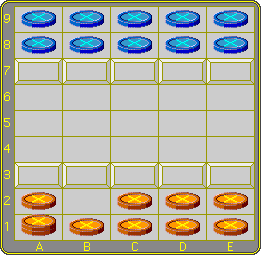Play Breakthrough interactively
The diagram shows the board and the pieces in the initial position. Players move in turn. White moves first.
Object
The object of the game is to be the first player to get a man onto the opponent's back row. However, blocking the opponent completely also constitutes a win.
Movement
In turn, each player moves one of his pieces any number of squares diagonally, either forward or backward, with these restrictions:
 |
|
Capacity
- Each square in the central three columns will hold at most two men.
- Each square in the side columns will hold at most one man.
Explosions
If a move results in a square exceeding its capacity, the square explodes, which means that it shoots its men to the adjacent squares in forwards and sideways directions.
- For the central columns this means one man straight forwards, one to the left and one to the right.
- For the side columns it means one man forwards and one sideways.
- The remainder, if any, stays on the original square.
Men dispersed by an explosion ignore the second and third restriction listed above under movement. Thus an explosion may require a piece to be dispersed onto a square occupied by an opponent's piece. This piece, whether a single man or a pair, is captured and removed from play. There is one important exception:
- A piece on the far wall is safe from capture: any opponent's man that explodes onto its square is instead eliminated itself.
 |  |
 |  |
| Chain reactions If an explosion and the resulting dispersal of men causes other squares to surpass capacity, these all explode as part of the same turn. The order in which to perform them is up to the player. An example can be given right from the start: if white opens with 1.b2a1, this causes a1 to surpass capacity, dispersing its contents to b1 and a2. The latter therewith also surpasses its capacity and in turn explodes its men to b2 and a3. All has settled down in the bottomright diagram. This is not at all an unusual opening move. | |
Strategy
Strategy is fairly obvious: you need an explosion from the far wall to get beyond. Side columns explode fastest, so a7 and e7 appear obvious targets for white to get his men on.
The drawback of this strategy is that, if successful, it gets a man across on the sidecolumn on a8 or e8, where a defender can block it with a single man on b9 or d9. If however the attacker next successfully targets the same square again by a second explosion from the same square on the wall he wins because this would cause the square on the eighth row to explode.
| An example game How I invented ... Breakthrough Breakthrough © MindSports | |||||||






